How the Dart Charge took its toll on motorists
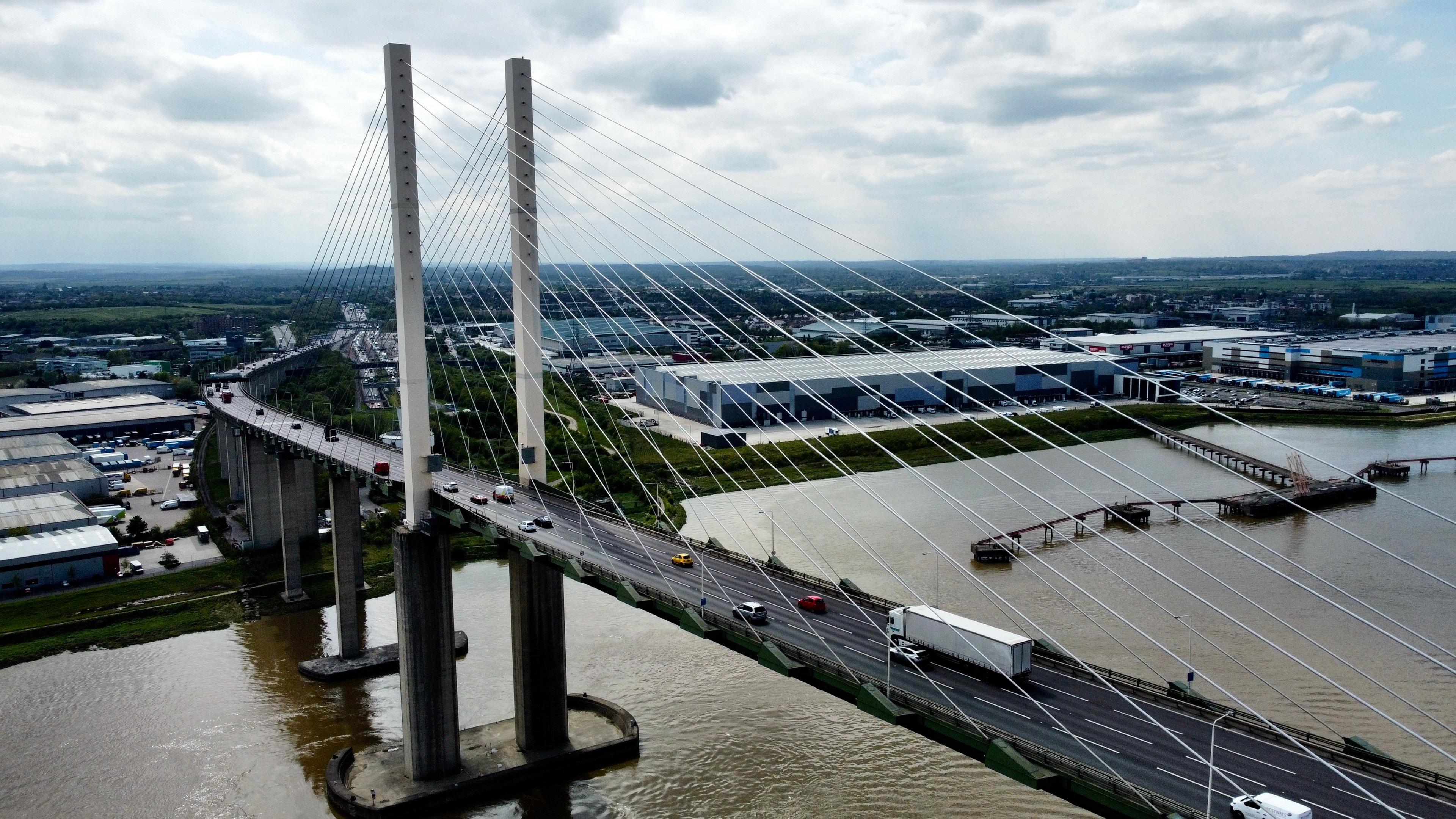
The Queen Elizabeth II Bridge connects the M25 in Thurrock, Essex, with the A2 in Kent
- Published
An ongoing investigation by the BBC has unearthed a raft of issues with the Dart Charge regime that ranges from accounts falling dormant, to motorists struggling to pay, to people being fined despite never using the crossing.
In the past few months, hundreds of people have contacted the BBC to share their experiences of Dart Charge problems.
The issues raised appear to stem from a change in Dart's contracted charging provider in July 2023.
National Highways, the government agency responsible for the crossing, acknowledges some of the problems and says it is working with its contractors to solve them.
But how has this situation come about and what is likely to happen next?
What is the Dart Charge?
The Dartford Crossing is part of the M25 takes more than 50m vehicles a year over and under the River Thames between Essex and Kent.
The crossing toll is called the Dart Charge and applies to both the Queen Elizabeth II Bridge and Dartford Tunnel between 06:00 and 22:00.
Different charges apply, external for different vehicle sizes; motorcycles go for free, cars cost £2.50, while motorhomes and larger lorries pay up to £6.
Payments are reduced for those with a Dart Charge Account or residents of Thurrock and Dartford, who can apply to join a discount scheme.
You can also pay online or by telephone either before or after you've crossed, but you must pay by midnight the day after you make the journey.
In 2022-23, Dart saw its revenue reach £215.9m, external, £13.6m more than the previous year.
Hang on, haven't we already paid for it?
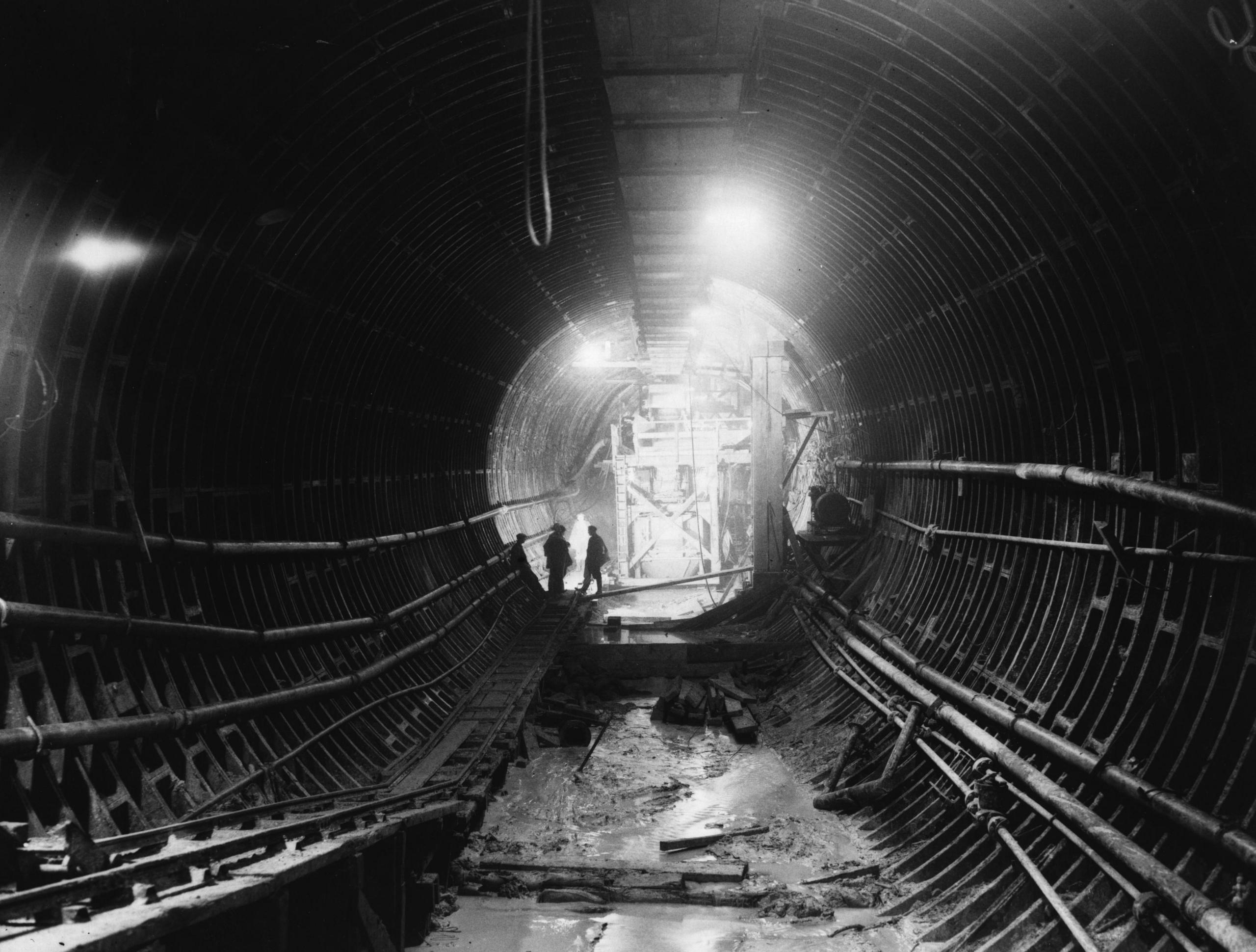
Work on the first Dartford Tunnel began in the late 1930s but was delayed by World War II and only recommenced in 1959.
Technically, yes.
An Act of Parliament in 1988, external established a private finance initiative (PFI) that saw Dartford River Crossing Limited, a private company, pay up front for the construction of the Queen Elizabeth II Bridge, with the costs to be recouped after completion through user tolls.
It opened in 1991 and cost £120m to build.
Tolls were due to end on 1st April 2003 when the initial PFI contract ended.
But the Transport Act 2000, external introduced charging schemes for all trunk roads, bridges and tunnels that spanned more than 600m (1,969ft), which allowed the Highways Agency to continue to charge a crossing fee.
How has the crossing changed?
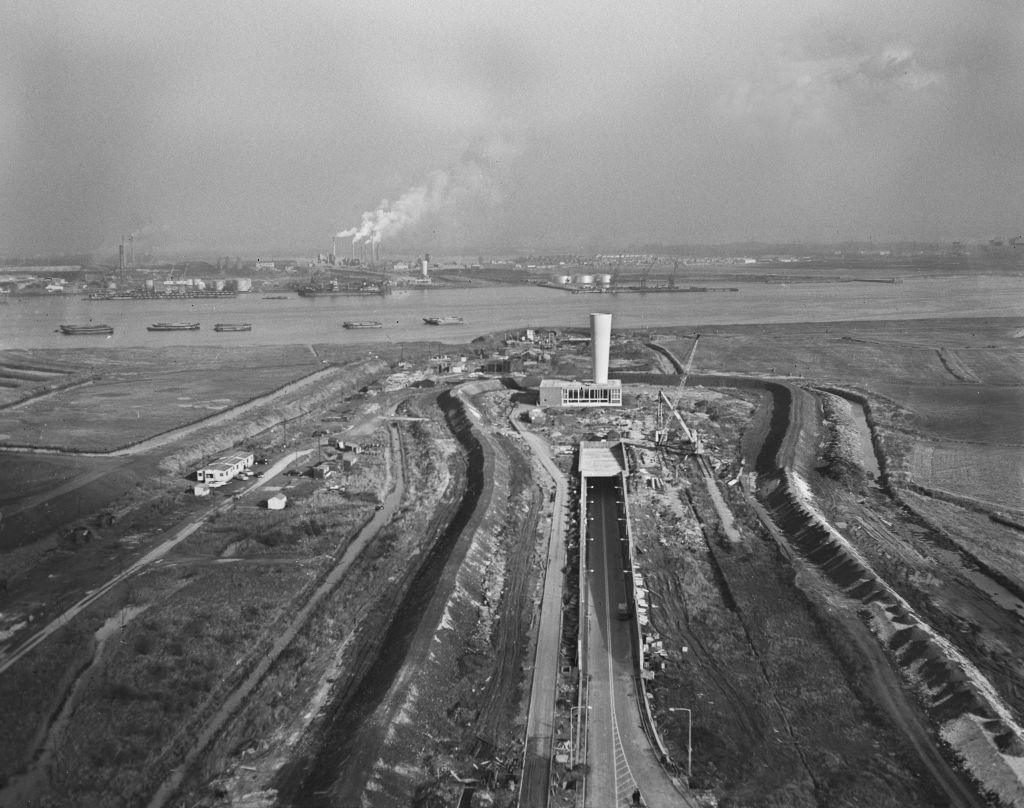
Work on the two bore holes was interrupted by World War Two
The idea of a tunnel between Essex and Kent was first proposed by the Ministry of Transport in 1924 to replace an existing ferry service between Tilbury and Gravesend.
Work on the first of two bore hole tunnels began in the late 1930s but was delayed by World War Two and resumed nearly two decades later in 1959.
The western tunnel opened to traffic in November 1963, and was expected to carry about two million vehicles each year.
'We were wrongly fined for Dart Charge during a funeral'
- Published24 July 2024
Drivers get Dart fines despite not using crossing
- Published12 August 2024
People lose £5m in unused Dart crossing payments
- Published25 July 2024
But demand quickly exceeded this and, by 1970, the then Conservative government announced a second tunnel was needed.
In May 1980 the eastern tunnel opened, allowing each tunnel to handle traffic in one direction.
The tunnels were subsequently connected to the M25 both north and south of the river but the completion of the M25 in 1986 also meant a huge increase in traffic using the crossing.
A business consortium in 1986 won a contract to add a bridge crossing. This would subsequently become the QEII Bridge.
What happened to all the toll booths?
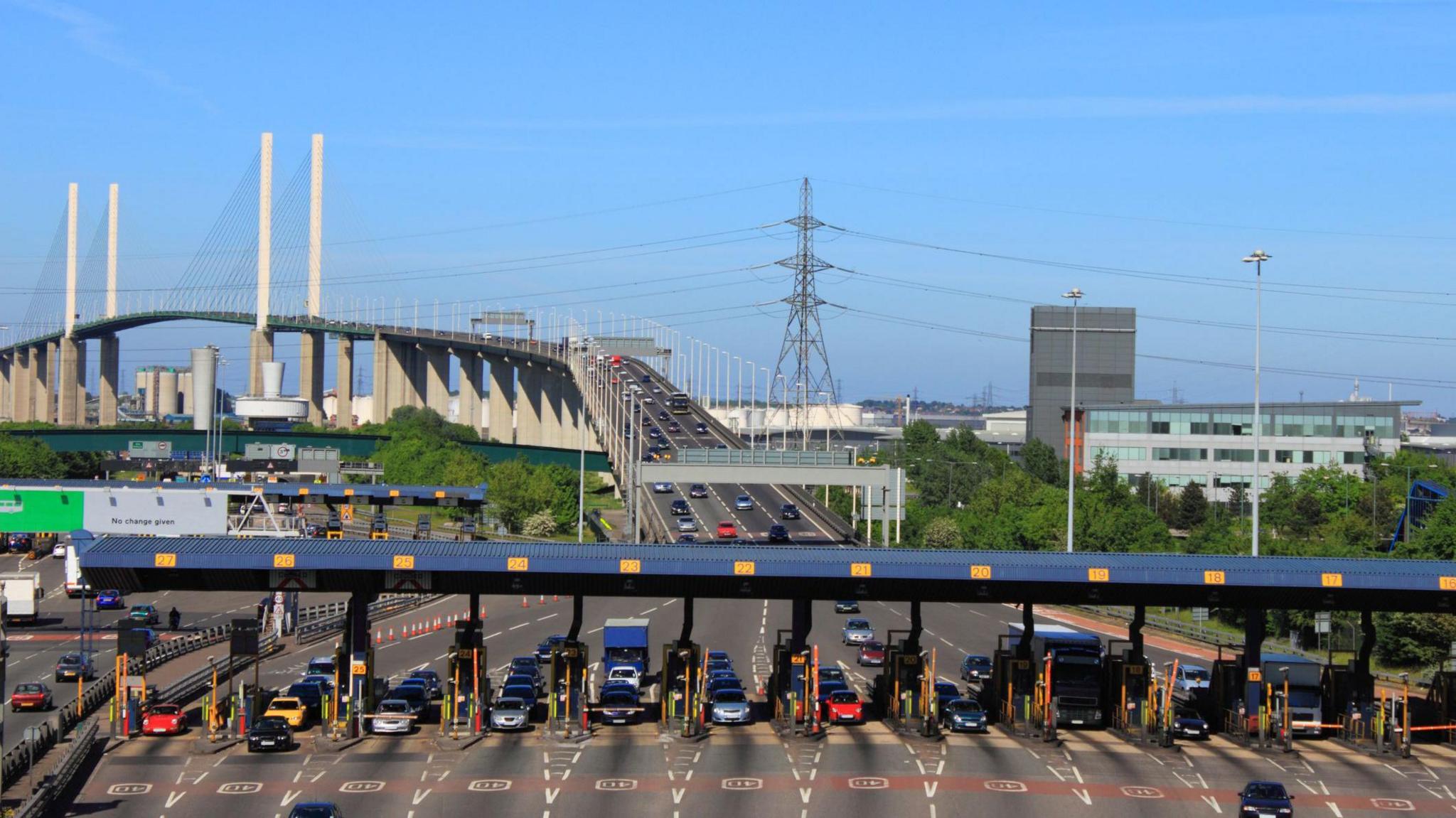
Following complaints from businesses that the toll-booths were impeding local growth, it was announced in 2014 that the toll booths would soon be consigned to history
Pre-payment accounts were first introduced by David Cameron's government; frequent users could get an electronic "DART-tag", external in their vehicles that automatically charged them as they went through a toll-booth.
Following complaints from businesses that the toll-booths were impeding local growth, it was announced in 2014 that the crossing would move to a "free flow charging scheme", which came into force that November., external
Project managers hailed the move as a success, reducing journey times by up to 15 minutes.
But a BBC report found that within the first year, 1.8 million fines had been issued to drivers for failing to pay the charge on time.
What has caused the current Dart problems?
In 2021, National Highways awarded two new operating contracts for the Dartford Crossing, which went live in July 2023.
Conduent Public Sector UK Limited won a £150m contract, external to run the charging system, using Automatic Number Plate Recognition (ANPR).
A second contract, external, worth £120m, external, was awarded to Emovis Operations Leeds Limited for enforcement, including issuing fines and collecting debt.
National Highways said Dart Charge account holders were sent an email prior to the switchover asking them to re-authorise their banking details so the new provider Conduent could take automatic payments.
But the BBC previously revealed only 770,000 of 1.7 million users had actually done this before the new system went live.
Data obtained via a BBC Freedom of Information request showed a rise about 6% to 8% in the number of crossings not been paid on time following the switchover in July 2023.
Users have reported a range of problems including payments not being taken from their Dart Charge accounts which, in turn, have triggered fines, and people receiving penalty charges in error due to mistakes by ANPR cameras.
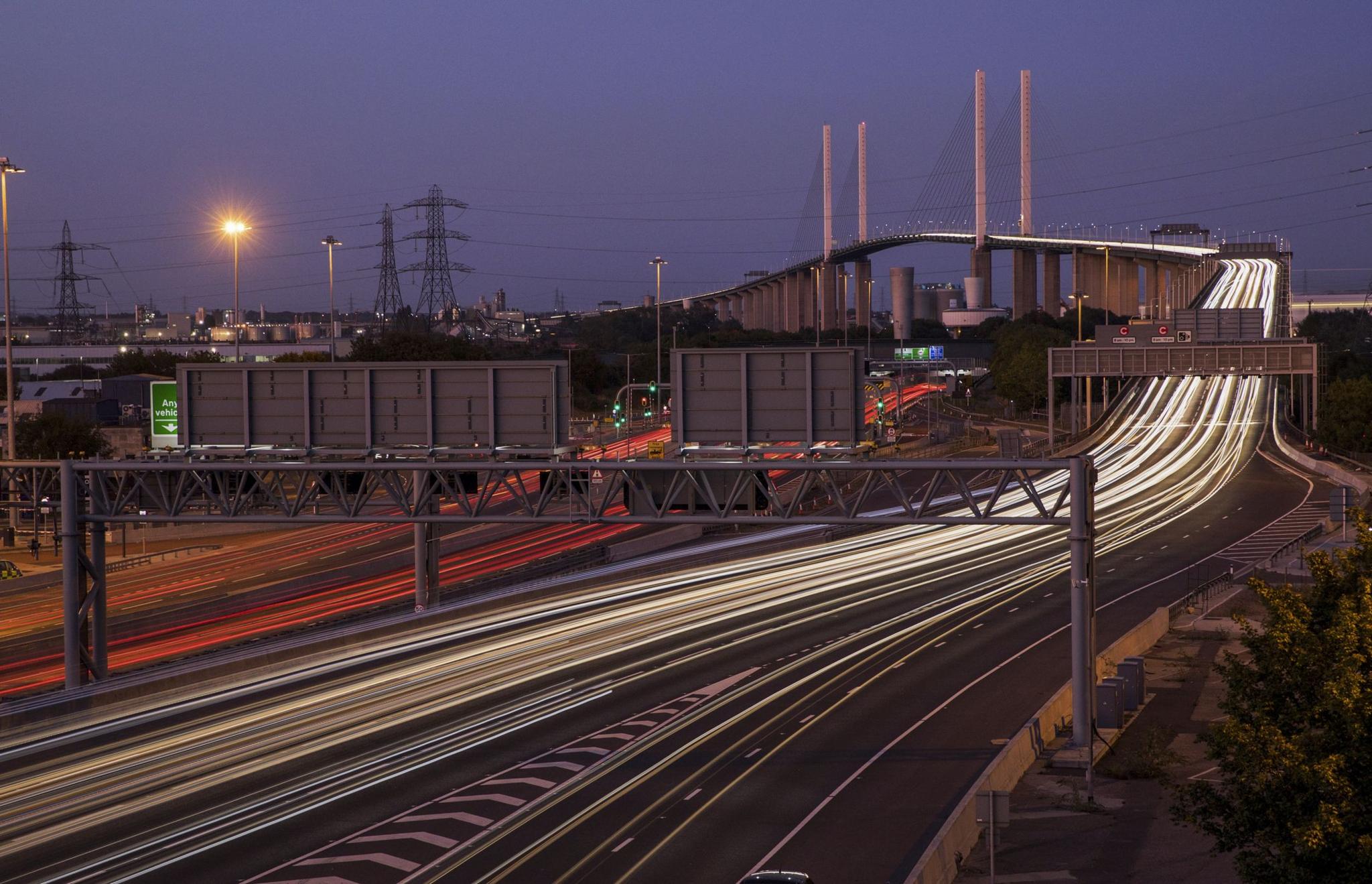
National Highways insists it is working with private providers to resolve the problems experienced by drivers.
What happens next?
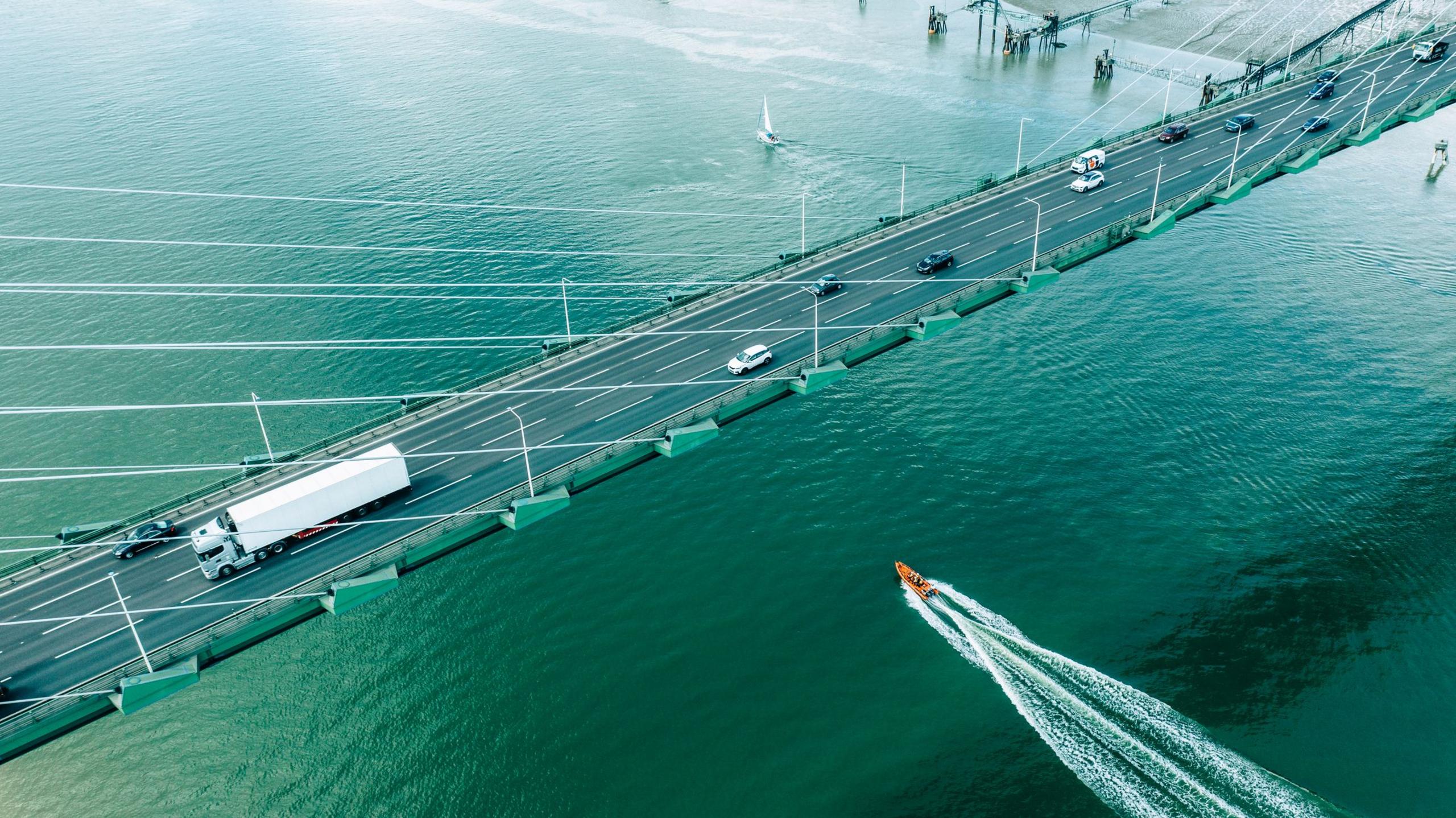
National Highways insists it is working with private providers to resolve the problems experienced by drivers
Jim Dickson, the MP for Dartford, has met with National Highways and raised concerns voiced by his constituents about the Dart Charge.
He says the agency is aware of these problems and is considering financial penalties for the firms operating the system.
Jen Craft, the MP for Thurrock, has shared the experiences of some of her constituents in the House of Commons and asked what more the government might do to help those penalised in error.
Transport Secretary Louise Haigh said she had received “several representations” from MPs about problems with Dart Charge.
She said it was essential that errors were cleared up “quickly and with compassion” and that her officials were working with National Highways to “drive down incorrect PCNs and provide much better support for customers”.
National Highways insists it is working with private providers to resolve the problems experienced by drivers.
The Traffic Penalty Tribunal, external says drivers should never ignore a PCN and urged them to challenge the notice directly with Dart Charge in the first instance if they feel it was wrongly issued.
The tribunal says representations should be made as soon as possible. If the appeal is refused, but the driver still believes it was issued in error, an appeal to the tribunal can be made.
Follow Essex news on BBC Sounds, Facebook, external, Instagram, external and X, external.
Get in touch
Do you have a story to share with the BBC East of England investigations team?